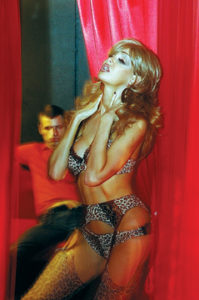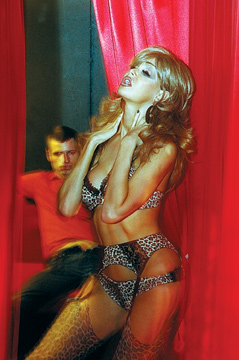Paul McLaughlin
Contributor (This Magazine)
Nina Arsenault has spent a fortune changing her appearance from male to female. The 37-year-old used to work in the sex trade, but now supports herself as a playwright, performer and motivational speaker to queer youth. Her one-woman show, The Silicone Diaries, recently had a second highly successful run in Toronto, was later performed in Montreal and will open in Vancouver next year.
MCLAUGHLIN: Where did you grow up?
ARSENAULT: In Beamsville, Ontario in the Golden Horseshoe Trailer Park. It was a really tight knit community. My memories of it are just great. But we moved when I was about six to a house in Smithville. It was very difficult to make friends because I was so feminine. Growing up in the trailer park and going to school with those kids, they always knew how girlish I was. With everyone on top of each other you have no choice but to accept people. [Then I moved and] being the new kid it was very, very difficult to make friends. I have been a bit of a lone wolf all my life.

M: In The Silicone Diaries you talk about seeing a female mannequin in a store at age five. What was it that affected you that day?
A: I think just the harmony and symmetry of the face spoke to me. I knew that I was a girl inside but I had this boy body. Then, for my visual gaze to rest upon a face that was a sculpture of a woman’s face, I just seized on that as a child. It affected me, the perfection of it.
M: When did you decide to begin plastic surgery?
A: About age 23, but I didn’t have my first procedure until I was 25.
M: What did you have done?
A: At first, just transsexual procedures to feminize myself. It got to a point where I looked as much like a normal woman as I possibly could; however, I still had masculine features. It was really traumatic on a daily basis to see those features. So I made the decision to really push the cosmetic procedures, knowing I would no longer look natural, that I would start to look plastic and artificial.
M: Like a mannequin?
A: Yeah. But I can’t say at the beginning of the journey I was trying to look like a mannequin or a Playboy bunny. I was just trying to be a woman.
M: Did you literally have 60 surgeries?
A: There were actually more. Some were just procedures, like a lip injection.
M: When was the last one?
A: In 2006.
M: How much did they cost?
A: Upwards of $200,000.
M: How did you afford that?
A: I was working in the sex trade and made an incredible amount of money so quickly there.
M: Men like “shemales”?
A: Yeah. In terms of supply and demand, there just aren’t a lot of us, but there’s a lot of interest. The first day I put my escort ad in the paper, I had 250 calls. I don’t think that’s something that’s spoken about that openly amongst otherwise heterosexual men. I could have worked from morning until night if I had wanted to.
M: What was it like working in the trade?
A: It was physically very tough. And I only did oral, no fucking.
M: A lot of transgender women work in the sex business. Why is that?
A: It’s one of the few places you can get work and feel safe. If you’re visibly transgender you’re going to be one of the most disenfranchised and disadvantaged people in culture.
M: You have two graduate degrees, right?
A: I do. But it’s tough to get straight work. You can’t imagine the amount of transphobia out there.
M: How long have you been out of the trade?
A: About three years. I support myself now as a performer.
M: In the play you mention that you have had your testicles removed. But you kept your penis. Why was that, if your goal was to be as close to a woman as possible?
A: I never knew what would happen to me financially so [if I still had my penis] I could always return to the sex business.
M: What has the play done for you?
A: It has been an incredibly healing ritual. I think I wrote it because I had a lot of emotional angst and suffering that I needed to express, that I needed someone to bear witness to. It makes me stronger every time I perform it.
M: Do you feel 100 percent female now or still a bit male?
A: I’ve always known I was a woman but I was socialized as a male. I have some qualities people see as male – I’m an aggressive thinker – but my core is definitely female.
M: Do you feel beautiful enough now?
A: I don’t work on the outside anymore. I concentrate now on inner work.
M: Any more surgeries ahead?
A: No. Not until I start to really visibly age.
This piece is reprinted with the permission of This Magazine. For more articles on Canadian politics, pop culture and the arts, check out www.this.org.
An interview with York grad and transgender icon Nina Arsenault




